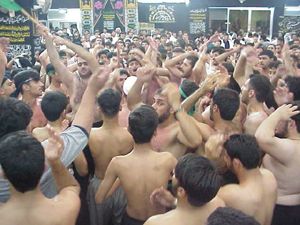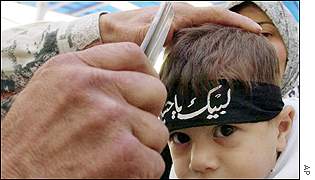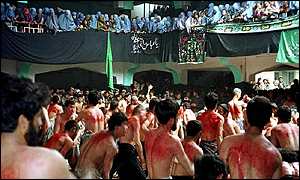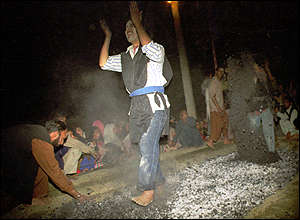Other links
Cityof knowledge debate on wasila and shirk video debate on azadari
videos of azadari noha/qasidas sahih bokhari and sunnis
Debate on Azadarie Hussain A.S
Salam
I want to share a debate with you a debate I had with some of my friends on Azadari-e-Hussain A.S. If I am wrong just send me your comments with some refrencies and I will try to correct me. But I hope also that you read this debate carefully with open mind and eyes.
And not like what
Quran said: 002.018
YUSUFALI: Deaf, dumb, and blind, they will not return (to the path).
First Question they asked me:
You people continue to weep for Imam Husain (a.s.) on Ashoora and other days of martyrdom. We see shias weeping all the time. Why weeping on a martyred person , we Must be happy and say thaks to god all the time?
Answer: I will show you some ayats,
"And that is He it is Who makes (men) laugh and makes (them) weep;" (Surah Najm 53:43)
It is said that Prophet Yaqoob (a.s.) wept so much for his son Yusuf (a.s.) that the pupils of his eyes became white.
"And he turned away from them, and said: O my sorrow for Yusuf! And his eyes become white on account of the grief," (Surah Yusuf 12:84)
Islam is a simple religion, and its not against nature. Weeping is a natural act. We do not weep all the time we are happy when Family of Prophet (peace be up on him ) are happy. We do not weep in Eids and in Birth days of our leaders. But sad days make us emotional and we weep . This is our love to our Allah and his Prophet (pbuh)
Question: Weeping for alive people is maybe right but what about dead people? Crying for a dead person is not right the spirit feel it dificult of that person and also it is not halal to weep for dead people.
Answer: The Prophet (s.a.) himself wept on many occasions. It is related from Anas bin Malik: The Prophet said, "Zaid took over the flag and was martyred. Then it was taken by Jafar who was martyred as well. Then Abdullah bin Rawaha took the flag but he too was martyred," and at that time the eyes of Allahs Apostle were full of tears.
(Sahih Bukhari Volume 2, Hadith 338)
Question : But Prophet did not weept for Imam Hussain A.S ! why do you do that when Prophet (pbuh) did not?
Answer: He (s.a.) also wept for Imam Husain (a.s.) on various occasions. For example, on the day Husain (a.s.) was born. And whenever the he (s.a.w.s.) prophesied the martyrdom of Imam Husain (a.s.). Zainab binte Jahash the wife of Prophet (s.a.w.s.) narrates: One day the Messenger of Allah (s.a.w.s) was in my house and Husain (a.s.) was also there. For some moments I forgot about him. He entered into the Prophets room. I tried to pick him up but the Messenger of Allah restrained me. Then he stood up to perform the prayers while holding Husain (a.s.) in his arms. When he went into ruku (bending in genuflection) or sajdah (prostration) he put down Husain (a.s.) and again took him in his arms when he stood up. Then he sat down and wept. When he finished his prayers I said, "O Messenger of Allah! Today I have seen you do something that I had never seen before."
He said, "Jibraeel came to me and informed me that this Husain (a.s.) will be killed by my ummat (people)."
(Mustadrakul Sahihain, 4:398)
Many traditions prophesising the martyrdom of Imam Husain (a.s.) are mentioned in the Shia and Sunni books. If a person is well informed of Imam Husains tragedy, it is necessary that his emotions are raised. The emotions that emanate from the heart. And these emotions are motivated by sorrow and sadness. These do not come out only in tears and some words and dirges. How eloquently the following couplets express it:
"My eyes weep for you not for some sawaab (reward)
But my eyes weep due to the tragedy that has befallen you."
Question: But you do stop at weeping. You do chest beating too?
Answer: "Then came forward his wife in grief, she smote her face and said (what! I) an old barren woman?"
Thus it is evident that smiting the face was not an objectionable act in the sight of Allah, otherwise Allah would have reprimanded her for doing so. Prophet was near her and angels too. No one stop her because it was a human reaction. When we hear aboutgrand daughter of Prophet Muhammed we get same emotions Hadhrath Sara (as) had.
Question: You told me that Islam is a religion which is with nature. But cutting your body parts or beating your self with chains cannot be good for health! What do you say about that?
Answer: I will give you answer from quran :
012.085
YUSUFALI: They said: "By Allah! (never) wilt thou cease to remember Joseph until thou reach the last extremity of illness, or until thou die!"
Question: Yor are wrong because it happen in laws of other prophets (pbuh) , But in new laws from Muhammed (pbuh) it is not allowed? Can you give me any refrence of hadith?
Answer:
Well quran is a book for universe and this a book to give us all answers. But I can give some refrencies from history and ahaiths too. ( from non Shia books).
The mourning rituals of the Sahaba, wives and Ahl'ul bayt (as)
i) Beating and mourning by a Bedouin / Sahaba
We can read from the book of Muwatta of Imam Malik, that a Bedouin came to Holy Prophet (s.a.w) while beating his chest and tearing his hair in front of the holy prophet (s.a.w) because he slept with his wife while fasting during month of Ramadhan.
Sunni book:
Yahya related to me from Malik from Ata ibn Abdullah al-Khurasani that Said ibn al-Musayyab said, "A bedouin came to the Messenger of Allah, may Allah bless him and grant him peace, beating his breast and tearing out his hair and saying, 'I am destroyed.' The Messenger of Allah, may Allah bless him and grant him peace, said, 'Why is that?', and he said, 'I had intercourse with my wife while fasting in Ramadan.' The Messenger of Allah, may Allah bless him and grant him peace, asked him, 'Are you able to free a slave?', and the man said, 'No.' Then he asked him, 'Are you able to give away a camel?', and the man replied, 'No.' He said, 'Sit own,' and someone brought a large basket of dates to the Messenger of Allah, may Allah bless him and grant him peace, and he said to the man, 'Take this and give it away as sadaqa.' The man said, 'There is no one more needy than me,' and (the Messenger of Allah, may Allah bless him and grant him peace), said, 'Eat them, and fast one day for the day when you had intercourse.' "
The incident should be considered in the light of the following facts :-
1. The Bedouin being a Muslim was Sahabi (companion) of the Holy Prophet (s.a.w).
2. He was beating his chest and tearing his hair in presence of Holy Prophet (s.a.w) who neither objected to it nor reprimanded him for the same.
3. The action of the Bedouin was a result of spiritual pain he suffered as his fast was invalidated.
4. This incident has been authentically recorded by Sunni traditionists.
(ii) Beating and mourning by Bilal A.S
Sheikh Abdul Haq Mohaddis Hanafi Dehlavi who is regarded as one of the greatest Scholars of the Sunni Sect, describing the events at the fatal illnes of the Holy Prophet (s.a.w) in his book 'Modaarejun Nubuwwat' vol II page 544 records:-
"Bilal (r.a) emerged beating his head and loudly wailing (from the room of Aisha)."
Even in this case none of the companions raised any objection at the action of Bilal, the special Muezzin of the Prophet (s.a.w). Moreover, the Holy Prophet (s.a.w) was yet alive and not dead. This is the extreme extent of grief. Then how can similar action for Imam Hussain (a.s) be prohibited?
|
Fatima Zahra (a.s) hearing the rumour of the martyrdom of the Holy Prophet (s.a.w) at Uhud came out of her house running and beating her head |
|
|
|
Sheikh Abdul Haq Mohaddis Hanafi Dehlavi |
Allamah Shibli Numani al Hanafi is a renowned Sunni scholar from the Indian subcontinent, in his Sirat-un Nabi (Eng translation Volume 2 pg 74) quoting Sirat Ibn Hisham we read following Hadhrath Humza (ra) martyrdom:
(iii) Beating and mourning by the wives of the Sahaba
"The Holy Prophet (P) returned to Madina and found the whole city gone into mourning. Whenever he went, he heard wailing and lamentation in every house. He was grieved to find that all who fell in the battle had their mourners doing their duty to the memory of their dear ones; but their was none to mourn the death of Humza (ra). Overwhelmed with grief the words that there was none to mourn the loss of Hamza escaped his lips. The Ansaris were touched to the core when the remark came to their ears. They asked their women to go to the house of the Prophet (S) and lament over the death of Humza. The Prophet (p) thanked them for their sympathy, prayed for their well being, but added that it was not permissible to cry lamentations in memory of the dead. (Women in Arabia were used to wailing and lamenting aloud, they would tear off their garments, dig their nails into their cheeks, slap themselves on the face and put up loud screams. This undesirable practice was from that day stopped for future".
Suffice it to say:
The Sahaba's wives performed mourning rituals upon the death of Amir Humza (ra).
Coming back to Numani's final comments I would pose these questions:
1. If Lamenting was haraam why would the Prophet (S) had been saddened that no-one was mourning his slain Uncle?
2. Why would the Prophet (S) allow the women to do something that is haraam?
3. If as Numani tells us that this was a common practice amongst Arab women and it was banned it would have definitely received maximum publicity.
4. Beating and mourning by Ayesha and the other wives of the Prophet (S)
(iv) Beating and mourning by the wives of the Prophet (S)
Curiously, not a single wife of the Prophet (S) ever heard of this ban (as claimed by Numani). On the contrary Hadhrath Aisha regarded by Ahl'ul Sunnah as the most knowledgeable women on Qur'an and Sunnah performed the following when the Prophet (S) left this earth:
As narrated by al Tabari in History Volume 9 page 183 (English translation by Ismail Poonawalla)
Abbas narrates:
"I heard Aisha saying "The Messenger of God died on my bosom during my turn, I did not wrong anyone in regard to him. It was because of my ignorance and youthfulness that the Messenger of God died while he was in my lap. Then I laid his head on a pillow and got up beating my chest and slapping my face along with the women".
Need we say anymore? Would the wives of the Prophet (S) indulge in a haraam activity?
According to Musnad of Imam Ahmad Hanbal Vol. 6, page 274; Aisha mourned the demise of the Holy Prophet (s.a.w) with other women by beating her head.
(v) Beating and mourning by Sayyida Fatima Zahra (as)
Again the same book of 'Modaarejun Nubuwwat' Vol 2, page 163, the high ranking Sunni Scholar, Sheikh Abdul Haq Mohaddis Hanafi Dehlavi recorded that:
"Fatima Zahra (a.s) hearing the rumour of the martyrdom of the Holy Prophet (s.a.w) at Uhud came out of her house running and beating her head".
Does it not transpire from the above that beating of head during the act of mourning for a martyr is also allowed by the religion as Sayyeda (a.s) was well aware of the religious code and was also infallible according to aya tat-hir (33:33). In addition an action of any member of Ahl'ul bayt is a Sunnah for the Ithna Ashari Shia's, mourning is not bidah it is a Sunnah of Sayyida Fatima Zahra (as).
(vi) Beating and mourning for Imam Ahmad bin Hanbal death
From the book of 'Hayatul Aaiwan' it is recorded that :
"Caliph Mutawwakil ordered breast-beatings to be held at the spot where funeral prayers were offered over the dead body of Imam Ahmad bin Hambal (a founder of one of the Sunni schools of thought). Accordingly, some 25,00,000 persons including Muslims, Jews, Christians and Majusi gathered there and mourned Ahmad bin Hambal with breast-beatings."
It may be noted here that this Caliph, Mutawwakil is the same one who had completely demolished the sacred shrine of the Holy Prophet's grandson, Imam Hussain (a.s). Yet he has so much love and regard for Imam Ahmad Hambal that he not only beats his own breast, but commands other religious group also to follow his example!
Strange is the world to those people who just follow what they have been taught without trying to struggle to find the truth.
Our detractors will argue that self-flagellation is haraam because it causes pain to the body. To counter this we would present these references.
Previously we quoted the book of Muwatta of Imam Malk, that a bedouin came to Holy Prophet (s.a.w) while tearing his hair in front of the holy prophet, is this not the sort of injury oneself? Why did the Holy Prophet (s.a.w) not order the Bedouin to refrain from this action?
I
njure yourself with knives?
Question : But many shias do not like to use knives because you know that it is wrong. Why do not you stop them ?
The most explicit proof of self inflicted injury comes Owais Qarni, the great Muslim Sahaba, praised by both Shia as well as Sunni erudites, had an immense love for the Holy Prophet (s.a.w). When the news reached him in Yemen that two teeth of the Holy Prophet (s.a.w) were broken in the battle of Ohad, he extracted all his teeth. When the Holy Prophet (s.a.w) got the news in Medina that Owais had struck down all his teeth, he (s.a.w) exclaimed, "Indeed Owais is our devoted friend."
This event can be found written in 'Tazkeratul Aulia' by Sheikh Fariddun Attar, also 'Ihsanul Uyun' commonly known as 'Seerate Halbia' vol II, page 295.295.
We should point out that breaking one's teeth is a thousand times more painful than the beating of one's chest for a few hours. It is even more extreme than breast beating with chains or knives (Zanjir) because those who have suffered from tooth ache will understand the immense pain that circulates in the mouth and head. Compare the removal of a tooth to the forced removal of a full set of teeth without the benefit of modern day anaesthetic and instruments the pain must have been unbearable. This was clearly an act of great courage.
Question: What is logic behind your mourning? This is portraying a bad image for the Non Muslims? We are losing the real values of the teachings of Imam Hussain(AS)
Answer:
When Imam Hussain was the last person and he was alone in karbala . He asked for help three time but no one was there. He was asking us . A nation who remmber him still after 1400 years. We wish we could be with him.
If Image and blood spill was such an issue then why not examine the other fundamental of Islam. For instance all of the everyday aspects and which is all Wajib:-
1. Hijab; The kufr and non- Muslims see this as oppression of women, and question why a person should cover herself?
2. Jehad; The Kufr and non-Muslims see this as radicalism and fundamentalism.
3. Sacrificing of an animal, lots of blood spill, and the manner which non-Muslims see portray this.
4. How about going around the Kaaba? Kufar find it funny and question why do Muslims circulate around a stone?
5. Running between "Safa" and "Marwa". Etc?
6. Circumcision: Obviously a Fardh, is looked as a cruel act by the non-Muslims which we do to new born babies.
In India and Pakistan, during Muharram you will find that even Sunnis, Hindus and Sikhs participating in the Marches and taking part in chest beating and self-flagellation. So strong is the love expressed by Hindus and Sikhs to Imam Hussain (AS) that they view it as act of worship for which they will receive rewards - a means by which their prayers will be answered? So powerful are the processions in the Indian Subcontinent that Sikhs will even "proclaim" the words "YA ALI MADAD", demonstrating their love for Maula Ali (a.s)
If these rituals are portraying such a "BAD IMAGE" then CLEARLY then why are Sunnis and Kaffirs not being turned away from them? We should also point out that the number of converts to Shia'ism in the Indian Subcontinent is very large - rather than being repulsed by these rituals converts are attracted to these rituals. Remember many Sunnis have never heard of Imam Hussain (as), these rituals bring his martyrdom to the masses.
If image is such posing such problem, let say that Zinjeer of Tatbeer was completely abolished, what is there to say that KUFR are not going to try to Knit pick on the other aspect of Deen as mentioned above?
"Instead of telling the world that Human Rights, Truth, Justice, Integrity is what Imam Husayn stood for we are shown as barbarians who cut the heads of their babies"
The message of Imam Hussain(AS) is strong!! As promised by the Prophet (S), it will remain intact till the day of Judgement!! To say that the message of Imam Hussain(AS) is lost is ludicrous as it goes against the traditions of the Prophet(S).
On the birth of Imam Hussain(AS), when Angel Gabriel informed that this child would be one day be martyred, Lady Fatima(AS) wept and asked the Prophet(PBUMHF) who will be there to mourn for him? , The Prophet(PBUMHF) assured her that group of people shall arise and will mourn her child till the day of Judgement, and he said this in a POSITIVE MANNER. No where did he state that Shias shall indulge in Haram acts, when they will mourn for Imam Hussain(AS).
Had the message really been lost, we would have been seeing a very different Islam today Islam is ALIVE TODAY BEACAUSE OF THEIR(AS) SACRIFICE, therefore on what basis do you state that the Imam Hussain(AS) values and teachings are lost. If this was the case then the ISLAM that we would be seeing today would not have been in the original form.
Question:But when did you begin with this chains and knives? Who started it?
Answer:
Hadrath Zaynab[sa] was the first person who hit her forehead to a bar inside the carriage she was in, causing considerable bleeding, when the head of al-Hussain (AS) was being paraded in Kufa. This is one evidence that the shedding of blood is permissible; whether from the head or from the back etc. The infallible Imam Zayn-el-'Aabidin (AS) used to address Lady Zaynab al-Kubra (AS) by saying to her "You are al-Hamdu-Lillah an untaught scholar" - "Anti al-Hamdu-Lillah 'Alimah Ghayr Mu'allimah"
|
Zaynab[sa] was the first person who hit her forehead to a bar inside the carriage she was in, causing considerable bleeding, when the head of al-Hussain (AS) was being paraded in Kufa. |
|
|
|
Bihaar al-Anwaar; volume 45, page 114 |
Needless to say that Allamah al-Majlisi compiler of Bihaar al-Anwaar and Sheikh al-Shariah al-Isfahani have confirmed the authenticity of the report.
1. Cityof knowledge
2. debate on wasila and shirk
3. video debate on azadari
4. videos of azadari
5. noha/qasidas
6. sahih bokhari and sahih muslim







